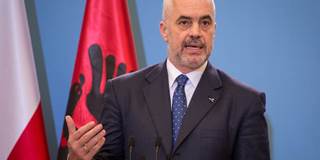Once the "North Korea of Europe," Albania now boasts an income level that is 25% that of Germany, double-digit export growth, and a strengthening currency. This suggests that the economists and multilateral institutions now being blamed for all sorts of disappointing outcomes may not be entirely useless after all.
TIRANA – Five years ago, Albania faced a truly ominous situation. With Greece and Italy reeling from the euro crisis, remittances and capital inflows were falling and the economy suffered a severe slowdown. The fiscal deficit ballooned to over 7% of GDP, financed to a large extent by arrears, as access to external financial markets had collapsed and domestic interest rates were sky high.
In addition, the power distribution company was in both an operational and a financial crisis, unable to pay for the electricity that it was supposed to buy from power generation companies. The arrears of both the government and the power company were fueling an increase in non-performing loans in the banking system. All the ingredients of a catastrophic outcome were there.
Fast-forward to the present: the economy is growing at a robust 4.2% rate, led by double-digit export growth in agriculture, mining, manufacturing, energy, tourism, and business services. At a time when emerging-market economies as diverse as Argentina, Turkey, Nigeria, and South Africa face plummeting currencies and rising interest rates, Albania has its lowest interest rates on record and a strengthening currency. It now has the lowest sovereign spread for any country in its rating class, indicating that markets think the rating agencies have been asleep at the wheel. Once the North Korea of Europe under Communist dictator Enver Hoxha, Albania’s per capita income level is now 25% that of Germany. If it can maintain its current growth rate, it will reach Germany’s current income in 32 years.

TIRANA – Five years ago, Albania faced a truly ominous situation. With Greece and Italy reeling from the euro crisis, remittances and capital inflows were falling and the economy suffered a severe slowdown. The fiscal deficit ballooned to over 7% of GDP, financed to a large extent by arrears, as access to external financial markets had collapsed and domestic interest rates were sky high.
In addition, the power distribution company was in both an operational and a financial crisis, unable to pay for the electricity that it was supposed to buy from power generation companies. The arrears of both the government and the power company were fueling an increase in non-performing loans in the banking system. All the ingredients of a catastrophic outcome were there.
Fast-forward to the present: the economy is growing at a robust 4.2% rate, led by double-digit export growth in agriculture, mining, manufacturing, energy, tourism, and business services. At a time when emerging-market economies as diverse as Argentina, Turkey, Nigeria, and South Africa face plummeting currencies and rising interest rates, Albania has its lowest interest rates on record and a strengthening currency. It now has the lowest sovereign spread for any country in its rating class, indicating that markets think the rating agencies have been asleep at the wheel. Once the North Korea of Europe under Communist dictator Enver Hoxha, Albania’s per capita income level is now 25% that of Germany. If it can maintain its current growth rate, it will reach Germany’s current income in 32 years.